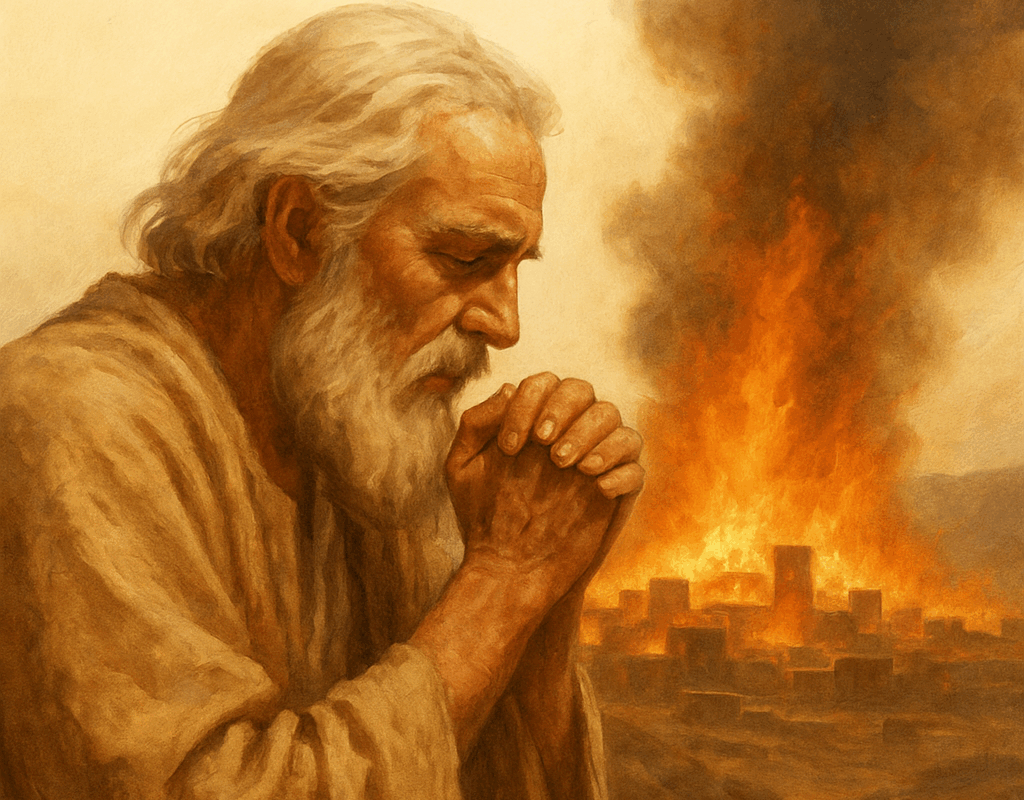How Abraham’s Prayer for Sodom Shows Us the Power of Compassionate Intercession Today
Have you ever felt helpless watching injustice unfold around you? Maybe you’ve prayed for:
- a struggling friend,
- financial help,
- or even the world itself,
wondering if God hears your pleas. If so, you’re not alone—and you’re in good company. In Genesis 18, Abraham’s prayer for Sodom offers a compelling look at how prayer, courage, and compassion still speaks to us today.
Let’s read this lesser-known story and see what it teaches us about standing in the gap for others—even when they don’t deserve it.
Abraham the Intercessor: A Bold Conversation with God
We often think of Abraham as the father of nations, a man of great faith, or the one who nearly sacrificed his son Isaac. But in Genesis 18:22–33, we find another powerful side of him: Abraham the intercessor.
“Then the men turned away from there and went toward Sodom, while Abraham was still standing before the Lord.”
(Genesis 18:22, NASB)
When God reveals His plan to destroy Sodom and Gomorrah due to their overwhelming wickedness, Abraham doesn’t stay silent. He steps forward with what can only be described as bold humility.
One of the most surprising aspects? Abraham doesn’t ask for justice—he asks for mercy.
The Compassion and Courage Prayer
Abraham didn’t live in Sodom. He wasn’t directly affected by its evil. But he cared deeply—perhaps because his nephew Lot lived there. More than that, Abraham displays what it means to have a heart burdened for others.
Using bold questions, Abraham asks:
“Suppose there are fifty righteous within the city; will You indeed sweep it away and not spare the place for the sake of the fifty righteous who are in it?”
(Genesis 18:24, NASB)
Then forty-five… then forty… all the way down to ten.
This wasn’t bargaining. This was persistent, heartfelt intercession.
Abraham shows us it’s okay—even holy—to ask big things of God when our heart is in the right place. He wasn’t selfish. He wasn’t accusing God of being unjust. Instead, Abraham was appealing to God’s mercy and righteousness at the same time.
“Far be it from You to do such a thing, to kill the righteous with the wicked… Shall not the Judge of all the earth deal justly?”
(Genesis 18:25, NASB)
What We Learn from Abraham’s Prayer for Sodom
Abraham’s prayer for Sodom isn’t just a story for us to read; it’s a powerful model for us today. Here’s what it teaches:
1. Intercession Is an Act of Love
Abraham prayed for people who were deeply sinful. He didn’t:
- write them off,
- or gloat in their downfall.
Truth is, Abraham stood in the gap with compassion—something we’re all called to do.
Who in your life is hard to pray for? A family member, public figure, or a hurting community? Abraham shows us we can bring all of it before God.
2. It’s Okay to Ask Boldly
Too often, we shrink back in prayer. But Abraham reminds us that God welcomes our questions, petitions, and honest emotions. We don’t need to be timid. We can approach God with boldness and reverence.
“Let me speak further, only once…” (Genesis 18:32, NASB)
Even as Abraham kept lowering the number, God listened. And He never got angry. He welcomed the conversation.
3. Prayer Can’t Always Change Circumstances, But It Changes Us
In the end, Sodom wasn’t spared. But Abraham’s willingness to intercede shaped his relationship with God. He was a friend of God (James 2:23)—and friends have hard conversations.
Sometimes the outcome isn’t what we hope for. But the act of interceding draws us closer to God and aligns our hearts with His.
Bringing It to Today: How to Apply Abraham’s Example in Modern Life
So how can you live out Abraham’s prayer for Sodom today?
- Pray for your city. Even if it feels spiritually dark, ask God to move. Start small—ten righteous people made all the difference in Abraham’s prayer.
- Intercede for others, even those far from God. They may never know you’re praying, but your compassion matters.
- Trust God’s justice and mercy. Like Abraham, you can wrestle with both, knowing God holds them in perfect balance.
Could We Be That Someone Who Stands in the Gap?
Abraham didn’t just believe God—he engaged Him. He questioned, pleaded, and loved. In doing so, he gives us a blueprint for how to pray with compassion and boldness, especially for others.
In a world that often rushes to judgment or indifference, be the one who prays. Because like Abraham’s prayer for Sodom, your intercession might be the most powerful act of love you can offer.
3 Questions for Us
Read Genesis 18:16–33 (NASB) and reflect on these 3 questions:
- Who do I need to intercede for, even if it’s difficult?
- Am I approaching God boldly in prayer or holding back?
- What does Abraham’s courage teach me about trusting God?
Let’s pray–God is listening!
In Christ,
- Bob
Discover more from Making Christ Known
Subscribe to get the latest posts sent to your email.
